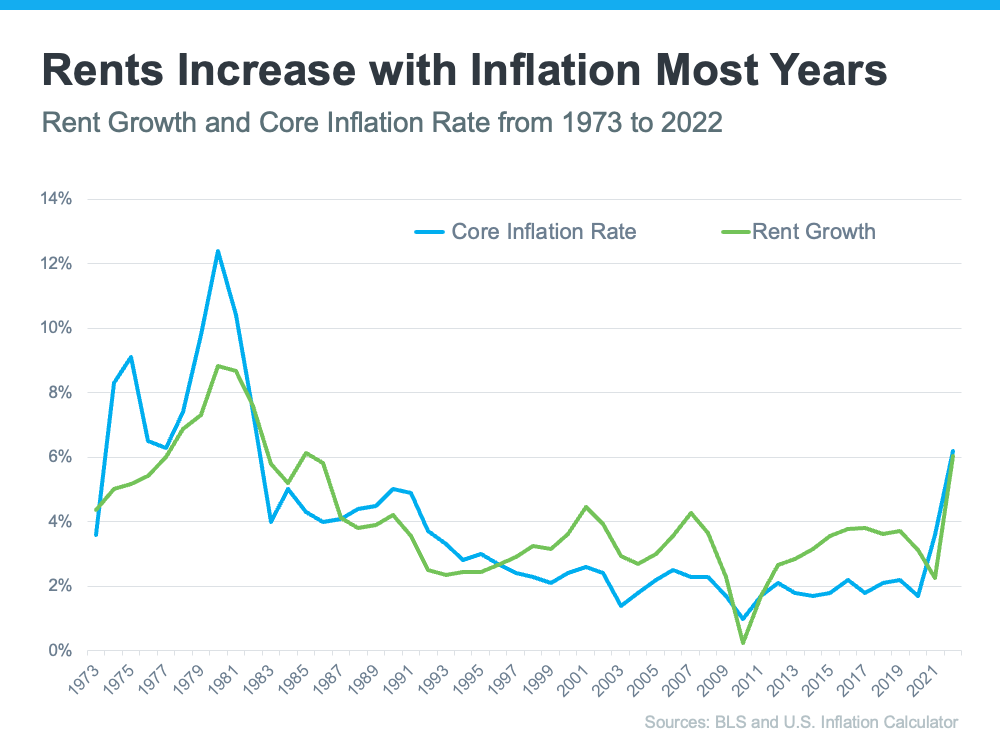You’re probably feeling the impact of high inflation daily as prices have increased on groceries, gas, and more. Inflation can erode the value of savings, investments, and even our income. However, one asset class has proven to be a reliable hedge against inflation: real estate, specifically homeownership. In this blog, we will explore how owning a home helps protect against inflation and why it is a solid investment in uncertain times. If you’re a renter, you’re likely experiencing it a lot as your rent rises. Between all those elevated costs and uncertainty about a potential recession, you may wonder if it still makes sense to buy a home today. The short answer is – it does. Here’s why.
1. Real Estate as an Inflation Hedge
Historically, real estate has demonstrated its ability to outpace inflation. When inflation rises, so do property values, and homeowners typically benefit from this increase in the market value of their homes. Unlike other investments like stocks or bonds, real estate offers a tangible asset that tends to appreciate over time. The land and property you own become more valuable as the cost of goods and services increases. In this way, owning a home is a natural hedge against inflation.
2. Appreciation and Equity
When you purchase a home, you are investing in an asset that has the potential to appreciate over time. In a rising inflationary environment, the value of your property tends to increase, allowing you to build equity. Equity represents the difference between the market value of your home and the remaining balance on your mortgage. As your home appreciates, your equity grows, giving you a stronger financial position and more options in the future.
3. Rent vs. Mortgage Payments
Renting a home might seem more affordable in the short term, but it needs more long-term benefits of homeownership. Inflation can significantly impact rental prices, and as costs rise, tenants may face increased monthly payments. In contrast, homeowners with fixed-rate mortgages enjoy the advantage of stable monthly payments throughout their loan term. This predictability protects homeowners from inflation-induced rent hikes and provides financial security.
4. Leveraging Debt
One of the unique advantages of real estate is the ability to leverage debt, specifically through mortgages. In an inflationary environment, the value of your home appreciates while the debt you owe remains constant. This means that the real value of your debt decreases over time as your income typically rises to keep pace with inflation. Using debt strategically to invest in real estate, homeowners can effectively amplify their returns and build wealth over the long term.
5. Diversification and Stability
Diversification is crucial for safeguarding your financial portfolio in times of economic uncertainty. Real estate offers an excellent opportunity to diversify your investment portfolio, as it often correlates poorly with other asset classes like stocks and bonds. Real estate investments provide stability and are a reliable anchor during economic turbulence. Owning a home spreads your risks and reduces your investments’ overall volatility.
6. Homeownership shields you from the rising costs inflation brings.
Freddie Mac explains how:
“Not only will buying today help you begin to build equity, a fixed-rate mortgage can stabilize your monthly housing costs for the long-term even while other life expenses continue to rise – as has been the case the past few years.”
Unlike rents, which tend to rise with time, a fixed-rate mortgage payment is predictable over the life of the mortgage (typically 15 to 30 years). And, when the cost of most everything else is rising, keeping your housing payment stable is significant.
The alternative to homeownership is renting – and rents tend to move alongside inflation. That means as inflation goes up, your monthly rent payments tend to go up, too (see graph below):

A fixed-rate mortgage allows you to protect yourself from future rent hikes. With inflation still high, when your rental agreement comes up for renewal, your property manager may decide to increase your payments to offset the impact of inflation. That could be why, according to a recent survey, 73% of property managers plan to raise rents over the next two years.
Having your largest monthly expense remain stable during economic uncertainty is a major perk of homeownership. If you continue to rent, you don’t have that same benefit and aren’t as protected from rising costs.
Owning a home is not just about having a place to live; it is a sound investment that can protect against the erosive effects of inflation. A stable housing payment is especially important in times of high inflation. Let’s connect so you can learn more and start your journey to homeownership today.

